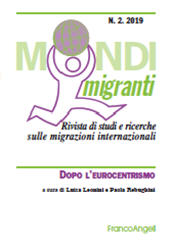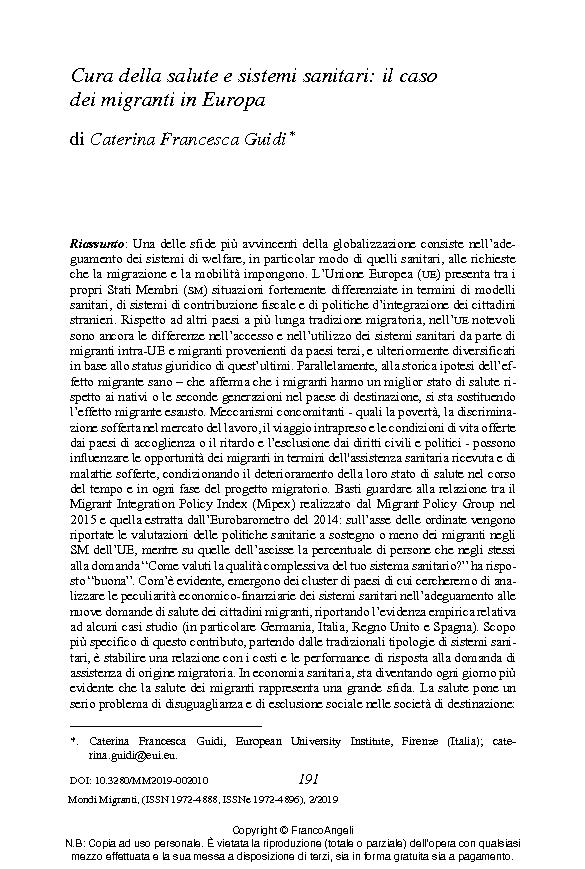Cura della salute e sistemi sanitari : il caso dei migranti in Europa
191-207 p.
Una delle sfide più avvincenti della globalizzazione consiste nell'adeguamento dei sistemi di welfare, in particolar modo di quelli sanitari, alle richieste che la migra-zione e la mobilità impongono. L'Unione Europea (UE) presenta tra i propri Stati Membri (SM) situazioni fortemente differenziate in termini di modelli sanitari, di sistemi di contribuzione fiscale e di politiche d'integrazione dei cittadini stranieri. Rispetto ad altri paesi a più lunga tradizione migratoria, nell'UE notevoli sono an-cora le differenze nell'accesso e nell'utilizzo dei sistemi sanitari da parte di migran-ti intra-UE e migranti provenienti da paesi terzi, e ulteriormente diversificati in base allo status giuridico di quest'ultimi. Parallelamente, alla storica ipotesi dell'effetto migrante sano - che afferma che i migranti hanno un miglior stato di salute rispetto ai nativi o le seconde generazioni nel paese di destinazione, si sta sostituendo l'effetto migrante esausto. Meccanismi concomitanti - quali la povertà,
la discriminazione sofferta nel mercato del lavoro, il viaggio intrapreso e le condizioni di vita offerte dai paesi di accoglienza o il ritardo e l'esclusione dai diritti civili e politici - possono influenzare le opportunità dei migranti in termini dell'assistenza sanitaria ricevuta e di malattie sofferte, condizionando il deterioramento della loro sta-to di salute nel corso del tempo e in ogni fase del progetto migratorio. Basti guardare alla relazione tra il Migrant Integration Policy Index (Mipex) realizzato dal Migrant Policy Group nel 2015 e quella estratta dall'Eurobarometro del 2014: sull'asse delle ordinate vengono riportate le valutazioni delle politiche sanitarie a sostegno o meno dei migranti negli SM dell'UE, mentre su quelle dell'ascisse la percentuale di persone che negli stessi alla domanda "Come valuti la qualità complessiva del tuo sistema sanitario?" ha risposto "buona". Com'è evidente, emergono dei cluster di paesi di cui cercheremo di analizzare le peculiarità economico-finanziarie
dei sistemi sanitari nell'adeguamento alle nuove domande di salute dei cittadini migranti, riportando l'evidenza empirica relativa ad alcuni casi studio (in particolare Germania, Italia, Regno Unito e Spagna). Scopo più specifico di questo contributo, partendo dalle tradizionali tipologie di sistemi sanitari, è stabilire una relazione con i costi e le performance di risposta alla domanda di assistenza di origine migratoria. In economia sanitaria, sta diventando ogni giorno più evidente che la salute dei migranti rappresenta una grande sfida. La salute pone un serio problema di disuguaglianza e di esclusione sociale nelle società di destinazione: comprendere le variabili, fondatrici e co-fondatrici, è un esercizio fondamentale per studiare le determinanti di accesso, uso e la qualità dei servizi sanitari. La difesa della sostenibilità dei sistemi sanitari dal lato del finanziamento è un prerequisito perché questa grande sfida sia affrontata e vinta in Europa. [Testo dell'editore].
In these globalization times, one of the most compelling challenges is the adaptation of welfare systems, especially health systems, to the requests that migration and mobility impose. The European Union (EU) presents in its Member States (MS) highly differentiated situations in terms of healthcare systems, models, financing systems and policies of integration adopted towards foreign citizens. Compared to other countries with a longer migrant tradition, there are still significant differences in access and use of health services by intra-EU migrants and migrants from third countries in the EU, further diversified according to the legal status of the latter. In parallel, the historical hypothesis of the healthy migrant effect - which states that migrants have a better state of health than natives and second generation in their countries of destination, has been replacing by the exhausted migrant effect. Concurrent mechanisms - such as poverty, discrimination suffered in the labor market, the journey undertaken
and the living conditions offered by the host countries or the delay and exclusion from civil and political rights - can influence the opportunities of migrants in terms of healthcare received and diseases suffered, influencing the deterioration of their state of health over time and at every stage of the migration project. Looking at the relationship between the Migrant In-tegration Policy Index (Mipex) carried out by the Migrant Policy Group in 2015 and the values extracted from Eurobarometer (2014): on the vertical axis, the health policies in support of migrants in the EU MS are reported while the percent-ages of people who replied "Good" to the question: "How do you evaluate the overall quality of your healthcare system?" are on the horizontal axis. As it can be seen, clusters of countries emerge: from those we will try to analyze the economic-financial peculiarities of health systems to the adaptation to new health needs of migrant citizens, reporting the empirical evidence related to some case
(in particular, Germany, Italy, United Kingdom and Spain). Starting from the traditional types of health systems, a more specific aim of this contribution is to establish a relationship with the costs and performance of the response to the assistance request of migratory origin. In health economics, it is becoming more and more evident that the health of migrants is a major challenge. Health poses a serious problem of inequality and social exclusion in destination societies: understanding the variables, founders and co-founders, is a fundamental exercise to study the determinants of access, use and quality of health services for migrants. The defense of the sustainability of health systems on the funding side is a prerequisite for this great challenge to be tackled and won in Europe. [Publisher's text].
Ist Teil von
Mondi migranti : 2, 2019-
Artikel aus derselben Ausgabe (einzeln erhältlich)
-
Informationen
ISSN: 1972-4896
THEMENBEREICHE
KEYWORDS
- Salute, migrazione, misurabilità, evidence-based, politiche sanitarie
- Reproductive health, gender-based violence, migration, Vtp, Lampedusa, Sicily



